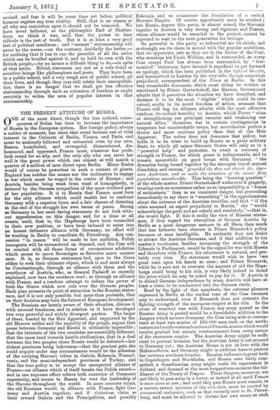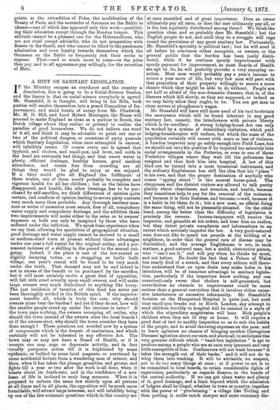THE PRESENT ATTITUDE OF RUSSIA.
ONE of the most direct, though the less noticed, conse- quences of Sedan has been to increase the importance of Russia in the European system. Her foreign policy, always a matter of moment, has since that event become one of vital interest to the Cabinets of Berlin, Vienna, and Paris, and must be anxiously followed and estimated even by our own. Beaten, humiliated, and revengeful, dismembered, dis- honoured, and oppressed, France must, whatever her pride, look round for an ally, and the only ally who can serve her well is the great power which can almost at will march a quarter of a million of men direct upon Berlin. Minor States would of course be powerless in such a contest of giants. England has neither the means nor the inclination to engage in war which must be waged in the centre of Europe ; and Austria, besides being weak from want of homogeneity, is fettered by the German sympathies of the more civilized part of her population. It is to Russia that France must turn for the only alliance which could enable her to confront Germany with a superior force, and a fair chance of dictating at the end of the struggle her own terms of peace. Strong as Germany is, her most daring statesmen do not look with- out apprehension on this danger, and for a time at all events, until, that is, the Hapsburgs have been reconciled to their new position, or have been induced to enter into an honest defensive affiance with Germany, no effort will be wanting in Berlin to conciliate SL Petersburg. Any con- cession " in reason " will be made to her ambition, Polish insurgents will be surrendered on demand, and the Czar will be courted with all those forms of ceremonious adulation which seems to move Sovereigns as flatteries move meaner men. It is, as German statesmen feel, open to the Czars either to seek their ultimate object, which is and must always be Constantinople, through an alliance with them and the overthrow of Austria, who, as General Fadaieff so recently explained, now bars the southern road ; or through an affiance with France, and a resolute attempt to reduce the power of both the States which now rule over the German peoples. Each plan presents its point of attraction to the Russian states- men, and it is not only possible, but more than probable, that on their decision may turn the future of European development.
The Russians are keenly aware of their situation, discuss it with unusual frankness, and in relation to it have developed two very powerful and widely divergent parties. The larger of these, headed by the Heir Apparent, and supported by the old Moscow nobles and the majority of the people, argues that peace between Germany and Russia is ultimately impossible ; that the interests of the two countries are essentially different, that the races tend towards hostile civilizations, that in a duel between the two peoples alone Russia would be defeated—her richest provinces being lukewarm—that the greatest gain she could acquire under any circumstances would be the adhesion of the outlying Slavonic tribes in Galicia, Bohemia, Transyl- vania, and the semi-independent provinces of Turkey, and that the true policy is to accept the unexpected affiance of France—an alliance which of itself breaks the Polish sword— and in one supreme effort relieve both countries of Germanic superiority, and secure to Russia for ever the leadership of the Slavons throughout the world. In more concrete terms, the old Russians would, in alliance with France, fight Ger- many and Austria together, and if victorious claim as their reward Galicia and the Principalities, and possibly Bohemia, and so commence the foundation of a united Slavonic Empire. Of course, opportunity must be awaited ; but Russia, argues this party, is almost armed, the Slavonic impulse in Austria is very strong and vigorous, and France, whose alliance would be essential to the project, cannot be expected to wait to the next generation for revenge.
So powerful is this party, so influential are its chiefs, and so strongly are its views in accord with the popular ambitions, that its opponents, safe as they are in the favour of the Czar, who worships his Uncle William, and is surrounded, as every Czar except Paul has always been surrounded, by " Ger- manized" statesmen, have deemed it expedient to put forward an apology, which has been published in the Official Gazette, and transmitted to London by the very able, though somewhat prejudiced, correspondent of the Times at Berlin. In this very remarkable document, which must either be written or sanctioned by Prince Gortschakoff, the Russian Government admits that it perceives the situation we have described, and declares it to be the most " eligible " which could be con- ceived, exults in its novel freedom of action, assumes that France will beg its alliance, admits, with the most offensive candour, its radical hostility to Austria, which Power "aims at strengthening our principal enemies and weakening our natural allies," threatens war in certain contingencies in temperate but unmistakable terms, but nevertheless prefers a slower and more cautious policy than that of the Heir Apparent. The writer does not denounce that policy, but holds it to be wiser to build up Russia as a great military State, to which all minor Slavonic States will rally as to a "powerful help " and protector, to await a recovery of strength in France, for which peace is indispensable, and to remain meanwhile on good terms with Germany, " the dynasties being bound together by the strongest ties of mutual friendship and esteem," provided she does not absorb the Ger- man Austrians, and so make the situation of the minor Slav populations unendurable. This being the "burning question " of the whole matter, Prince Gortschakoff walks over it gingerly, treating such an occurrence rather as an impossibility, a "dream of enthusiasts," than as an imminent danger, but proceeding immediately to say there is "something" in the apprehensions about the outcome of the Austrian troubles, and that " if the crisis assumed an aspect prejudicial to Russia," she " would acknowledge the peril and act calmly and resolutely,"—that is, she would fight. If this is really the view of Russian states- men, if they regard the absorption of German Austria by Berlin as a most dangerous menace to all Slays, then much that has hitherto been obscure in Prince Bismarck's policy becomes at once intelligible. He evidently does not desire to attract the Austrian Germans, and if that addition to his master's territories, besides increasing the strength of the Liberals in Parliament, would be the signal for war with Russia and therefore with France, his reluctance is natural, and pro- bably very wise. No statesman would wish to have two great wars upon his hands at once ; and Prince Bismarck, while he is sure not to overrate the amount of aid the Haps- burgs could bring to his side, is very likely indeed to dread the price which he may be asked to pay for it. If Austria is to defend German independence by arms, Austria will have at least a claim to be readmitted into the German circle.
Read by the light of this manifesto, the extreme pleasure expressed in Berlin at the cordial tone of the Czar becomes easy to understand, even if Bismarck does not overrate the fighting strength of the enormous empire at his side. In the event of renewed war with France, any army posted as the Russian Army is posted would be a formidable addition to the dangers which menace Germany, the Czar being able to concen- trate at least two armies of 120,000 men each on the north- eastern and south-eastern frontiers of Prussia, armies which would receive gradual but certain reinforcements from every corner of the enormous empire. The Austrian Army might be suffi- cient to prevent invasion, but the Austrian Army is not secured to Germany yet ; the Austrian House is not in love with the Hohenzollerns, and Germany might in addition have to protect her extreme northern frontier. Russian influence is great both in Copenhagen and Stockholm, and Russia once fairly com- mitted, a Scandinavian army might make its appearance in Jutland, and demand at the most inopportune moment the ful- filment of the Treaty of Prague. These dangers, moreover, are not likely to pass away in a hurry, or indeed at all until France is once more at rest ; and until they pass Russia must remain, to a certain extent, mistress of the situation, must be courted by ceremonial embassies, such as that recently sent to St. Peters- burg, and must be allowed to dictate her own terms on such points as the extradition of Poles, the modification of the Treaty of Paris, and the surrender of Germans on the Baltic to ukases—one of which has appeared only this week—prohibit- ing their education except through the Russian tongue. This attitude cannot be a pleasant one for the Hohenzollerns, who are not cruel except advisedly, who do not sympathize with Russia in the South, and who cannot be blind to the passionate admiration and even loyalty towards themselves which the Germans on the Baltic so frequently risk their necks to express. That—and so much more to come—is the price they pay, and to all appearance pay willingly, for the retention .of Metz.











































 Previous page
Previous page